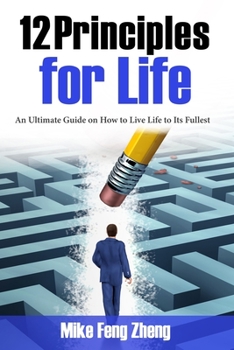12 Principles for Life: An Ultimate Guide on How to Live Life to Its Fullest
Sometimes you just keep on wondering what's wrong with you without having any answer found. Sometimes you just drink your coffee on it and move about your life occupying your mind with the tasks that you need to do. Wouldn't it be wonderful to turn around your life instead of just thinking about it? Please click on Mike Feng Zheng's name above to go to his Amazon author page and look at his other book, The Art of Money, to learn how to deal with and manage money at different levels. In his book, "12 Principles for Life: An Ultimate Guide on How to Live Life to Its Fullest", Mike Feng Zheng reveals twelve simple principles in your life that will guide you in living your life to the fullest. You can solve complex problems and unlock new ideas by applying these twelve principles, which will introduce you to a new perception of looking at how you do things in your life and how you can change them. It will help with maximizing your happiness and your emotional, financial, and psychological health. In chapter 1, we will look at how to use the fundamental principles or first principles of thinking to solve various life problems and challenges on a large scale. At the beginning of chapter 2, we argue that life has no meaning. However, we must deliberately give our lives meaning and purpose to live a more prosperous, satisfied, and contented existence. In chapter 3, we discuss which aspects of our lives are unimportant. What must we give up or lose to live a more fulfilling life. In chapter 4, we examine the mental capacity of humans. How can we use its power to control and determine our fate? Utilizing our mental capacity effectively can lead to the accomplishment of numerous goals that are significant to us. Chapter 5 discusses how to use the concept of tiny to form good habits gradually. The ideas of marginal rule and boundling temptation can be utilized as an effective method for developing good habits. The strategies that individuals can utilize to strengthen their self-discipline and willpower are dissected in Chapter 6. Chapter 7 discusses the fundamental idea of "I know that I know nothing," which is an essential concept. We must fully grasp this basic concept to pursue ongoing progress and improvement. Chapter 8 discusses how important it is to maintain your composure. We illustrate through stories and examples how maintaining our composure can help us emerge victorious in a competition. In chapter 9, we talk about the benefits that can come from experiencing pain, which is the driving force behind much of the progress humans have made. Having problems is a perpetual life problem. It is unrealistic to expect to go through life unscathed by any difficulties. The importance of maintaining a healthy work-life balance is emphasized in Chapter 10. On the one hand, we must keep our toughness, strength, and self-control. On the other hand, adopting a slow-living lifestyle is emotionally beneficial. Many people in the United States have very little knowledge about finances. Chapter 11 discusses fundamental ideas to help you manage your money more effectively. Chapter 12 discusses how to think about and deal with death. Many people are afraid of dying, so if we don't want to be in a state of anxiety and bewilderment, we need to adjust our internal mindset to face death appropriately. In conclusion, we summed everything up using the concept of stoicism, which has been a fundamental guide in many of the chapters we have covered.
Format:Paperback
Language:English
ISBN:B0BJYGHXB3
ISBN13:9798359373517
Release Date:October 2022
Publisher:Independently Published
Length:306 Pages
Weight:0.91 lbs.
Dimensions:0.6" x 6.0" x 9.0"
Customer Reviews
0 rating





